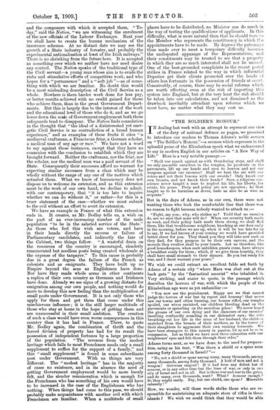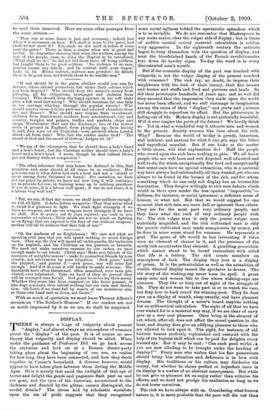"THE SOLDIER'S HONOUR."
TN dealing last week with an attempt to represent our view of the duty of national defence as pagan, we promised to introduce our readers to Thomas Adams's noble sermon on "The Soldier's Honour,"—a sermon which expresses in the splendid prose of the Elizabethan epoch what we endeavoured
to say in modern English in our articles on "A New Way of Life." Here is a very notable passage :—
"Shall war march against us with thundering stops, and shall we only assemble ourselves in the temples, lie prostrate on the pavements, lift up our hands and eyes to heaven and not our weapons against our enemies ? Shall we beat the air with our voices and not their bosoms with our swords ? Only knock our own breasts, and not knock their heads? Sure, a religious con- science never taught a man to neglect his life, his liberty, his estate, his peace. Piety and policy are not opposites ; he that taught us to be harmless as doves, bade us also be as wise as serpents."
But in the days of Adams, as in our own, there were not wanting those who took the comfortable line that there was no reason to fight because nobody wanted to attack us :—
"Fight, say you ; why, who strikes us ? Yield that no enemies do, are we sure that none will do ? When our security hath made us weak, and their policy hath made them strong, we shall Had them, like that troublesome neighbour, knocking at our door early in the morning, before we are up, when it will be too late for us to say, If we had known of your coming we would have provided better cheer for you. They thank you they will take now such as they find, for they purpose to be their own carvers, and the morsels they swallow shall be your hearts. Let us therefore, like good housekeepers, when such unbidden guests come, have always a breakfast ready for them ; which, if we give them heartily, they shall have small stcimach to their dinners. Be you but ready for war, and I durst warrant your peace."
We wish we could extract an excellent fable set forth by Adams of a certain city "where Mars was shut out at the back gate" by the "fantastical amorist" who inhabited it.
Very striking, and easier to quote, is the passage which describes the horrors of war, with which the people of the Elizabethan age were as yet unfamiliar :—
"You now see the punishment. Happy are we that cannot judge the terrors of war but -by report and hearsay ! that never saw out towns and cities burning, our houses rifled, our temples Spoiled, our wives ravished, our children bleeding dead on Um pavements or sprawling on the merciless pikes ! We never heard the groans of our own dying and the clamours of our enemies' insulting confusedly sounding in our distracted ears ; the wife breathing out her life in the arms of her husband, the children snatched from the breasts of their mothers, as by the terror of their slaughters to aggravate their own ensuing torments. We have been strangers to this misery in passion, let us not be so in compassion. Let us think we have seen these calamities with our neighbours' eyes and felt them through their sides."
Adams turns next, as we have done, to the need for prepara- tion, using as his text, "Was there a shield or a spear seen among forty thousand in Israel? "—
" No, not a shield or spear among many, many thousands, among many thousands, among forty thousand. A host of men and not a weapon ! Grievous exigent ! If it had been any defect but of armour, or in any other time but tho time of war, or only in on3 city of Israel and not in all. But is there war and war lathe gates, and do many, oven thousands, want? What? Armour enough ? So they might easily. Nay, but one shield, one spear? Miserable calamity ! '
How, we wonder, will these words strike those who are re- sponsible for maintaining an adequate store of rifles in these islands ? We wish we could think that they would be able to read them unmoved. Here are some other passages from the same sermon :— " That war at some times is just and necessary ; indeed, just when it is necessary, as here. For shall it come to the gates, and shall we not meet it ? Yea, shall we not meet it before it come rear the gates ? There is, then, a season when war is good and lawful. St. Augustine observes that when the soldiers, among the rest of the people, came to John the Baptist to be catechised, What shall we do?' he did not bid them leave off being soldiers, but taught them to be good soldiers. Do violence to no man, neither accuse any falsely ; and be content with your wages,' Luke iii. 14. Milites instruit, militare non prohibet— he directs them to be good men, not forbids them to be warlike men."
"If war should be in the gates, whither would you run for defence, where shroud yourselves, but under their colours which you have despised? Who should keep the usurer's money from pillaging, all his obligations, mortgages and statutes from burning ? Who should keep the foggy epicure in his soft chair after a full meal fast asleep ? Who should maintain the nice lady in her carriage whirling through the popular streets ? Who should reserve those delicate parlours and adorned chambers from fire and flames ? Who should save virgins from ravishment, children from famishment, mothers from astonishment, city and country, temples and palaces, traffics and markets, ships and shops, Westminster Hall and the Exchange, two of the richest acres of ground in England, from ploughing up; from having it said, Jam seges est ubi Troja frit—corn groweth where London stood—all from ruin? Who but the soldier under God? 'The sword of God and the sword of Gideon,' Judges vii. 18."
"We say of the chirargeon, that he should have a lady's hand and a lion's heart ; but the Christian soldier should have a lady's heart and a lion's hand. I mean, though he deal valiant blows, yet not destroy without compassion."
"The other inference that may hence be deduced is this, that munition and arms should at all times be in readiness. How grievous was it when Jabin had such a host and not a shield or spear among forty thousand in Israel' For ourselves, we have not our peace by patent, we know not how long it will continue ; let us provide for war, in training some up to military practices. If war do come, it is a labour well spent ; if war do not come, it is a labour very well lost"
"Put, we say, if that day comes, we shall have soldiers enough ; we will all fight. 0 duke bellutn inexpertis—They that never tried it, think it a pleasure to fight. We shall fight strangely if we have no weapons, and use our weapons more strangely if we have no skill. Non de pugna, set de fuga eogitant, gui nudi in ode ezponuntur ad ruktera—Their minds are not so much on fighting as on flying, that are exposed to the fury of war without weapons; neither will all be soldiers that dare talk of war."
"Oh the madness of us Englishmen ! We care not what we spend in civil jars, that yet will spend nothing to avoid foreign wars. They say the Jew will spend all on his pascha, the barbarian on his nuptials, and the Christian on his quarrels or lawsuits. We need not make ourselves enemies by our riches, we have enough made to our hands. Christ says 'Make you friends of the mammon of unrighteousness '—make to yourselves friends by your charity, not adversaries by your litigation. Seek peace,' saith the prophet, 'and pursue it '—seek peace, war will come fast enough. And if it do come it will hardly be made welcome. The Spaniards have often threatened, often assaulted, ever been pre- vented, ever infatuated. Take we heed if they do prevail they will be revenged once for all. God grant we never try their mercy. Whether they come like lions rampant, or like foxes passant, or like dogs couchant, they intend nothing but our rain and desola- tion. Oh Lord, if we must fall by reason of our monstrous sins, at thine own hand cast us down, not theirs.'
With so much of quotation we must leave Thomas Adams's sermon on "The Soldier's Honour." If our readers are not 88 much impressed by it 88 we are, we shall be surprised.



























































 Previous page
Previous page